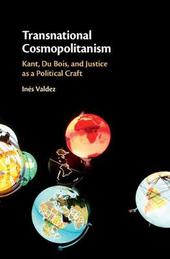
|
Transnational Cosmopolitanism: Kant, Du Bois, and Justice as a Political Craft
Hardback
Main Details
Description
Based on the theoretical reconstruction of neglected post-WWI writings and political action of W. E. B. Du Bois, this volume offers a normative account of transnational cosmopolitanism. Pointing out the limitations of Kant's cosmopolitanism through a novel contextual account of Perpetual Peace, Transnational Cosmopolitanism shows how these limits remain in neo-Kantian scholarship. Ines Valdez's framework overcomes these limitations in a methodologically unique way, taking Du Bois's writings and his coalitional political action both as text that should inform our theorization and normative insights. The cosmopolitanism proposed in this work is an original contribution that questions the contemporary currency of Kant's canonical approach and enlists overlooked resources to radicalize, democratize, and transnationalize cosmopolitanism.
Author Biography
Ines Valdez is Assistant Professor of political science at Ohio State University. Her work has appeared in the American Political Science Review, Political Research Quarterly, and Political Studies, among other outlets. She is the recipient of the Laurance S. Rockefeller Visiting Faculty Fellowship at the Princeton University Center for Human Values (2017-18) and an Experienced Researcher Fellowship from the Humboldt Foundation (2018-21).
Reviews'By reading Kant 'disloyally' and mining Du Bois's anticolonial writings, Ines Valdez advances a radically transformed cosmopolitanism. Transnational Cosmopolitanism makes the case - brilliantly - that Du Bois's vision of transnational politics is essential to understanding and challenging global injustice today.' Lawrie Balfour, University of Virginia 'This book makes a vital and timely contribution to the cosmopolitan and global justice literature by combining a rigorous investigation of Kantian and neo-Kantian theory with an equally rigorous, historically informed analysis of Du Bois's anti-colonial vision and Pan-Africanism. Valdez not only highlights the Eurocentric, racist, and exclusionary assumptions of the cosmopolitan tradition, she charts an alternative path of transnational solidarity that re-centers the contributions of subaltern counterpublics and expands cosmopolitan considerations beyond the ongoing limitations of imperialism.' Jeanne Morefield, University of Birmingham and author of Empires without Imperialism 'In this excellent book, Ines Valdez powerfully reminds us that the 'postnational constellation' is also a postcolonial one. Thus the task before us is to theorize the normative grounds and political possibilities of a truly transnational cosmopolitanism that is aware of the blind spots of its own traditions. The dialogues Valdez constructs between Kant and Neokantians on the one hand and Du Bois and critical race theorists on the other hand are exemplary for the new kind of critical political theory we need. A great achievement that opens many doors.' Rainer Forst, Johann Wolfgang Goethe-Universitat Frankfurt am Main 'In Transnational Cosmopolitanism political theorist Ines Valdez offers a readable and engaged explication of key ideas in the works of Kant and Du Bois about the intellectual origins of our modern conceptions of cosmopolitan identity and its limits. Offering a thoughtful narrative based on wide reading of the primary and secondary texts, Valdez establishes an important new voice in contemporary debates about the ideology of identity and its understudied transnational sources and implications. The book superbly exposes the fragility of political cosmopolitanism rooted exclusively in national conceptions of identity and nationhood.' Desmond King, Andrew Mellon Professor of American Government, University of Oxford 'Transnational Cosmopolitanism: Kant, Du Bois, and Justice as a Political Craft provides a theoretical framework to think about politics outside of the domestic and international realms which dominate theorization on cosmopolitanism, establishes W. E. B. Du Bois as a crucial interlocutor in the cosmopolitan literature, and opens dynamic new avenues of research on the political theory of transnationalism.' Emma Stone Mackinnon, The Review of Politics
|